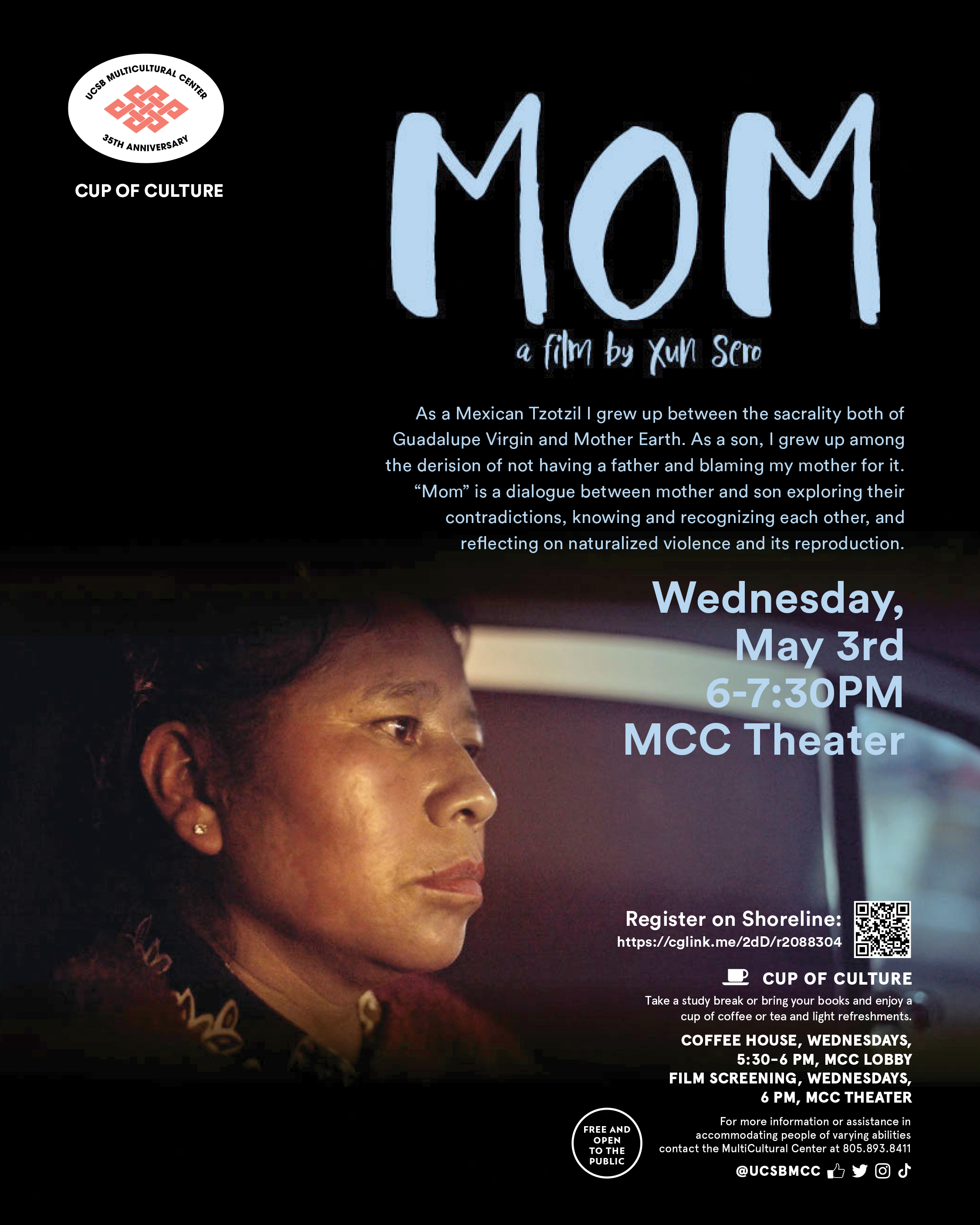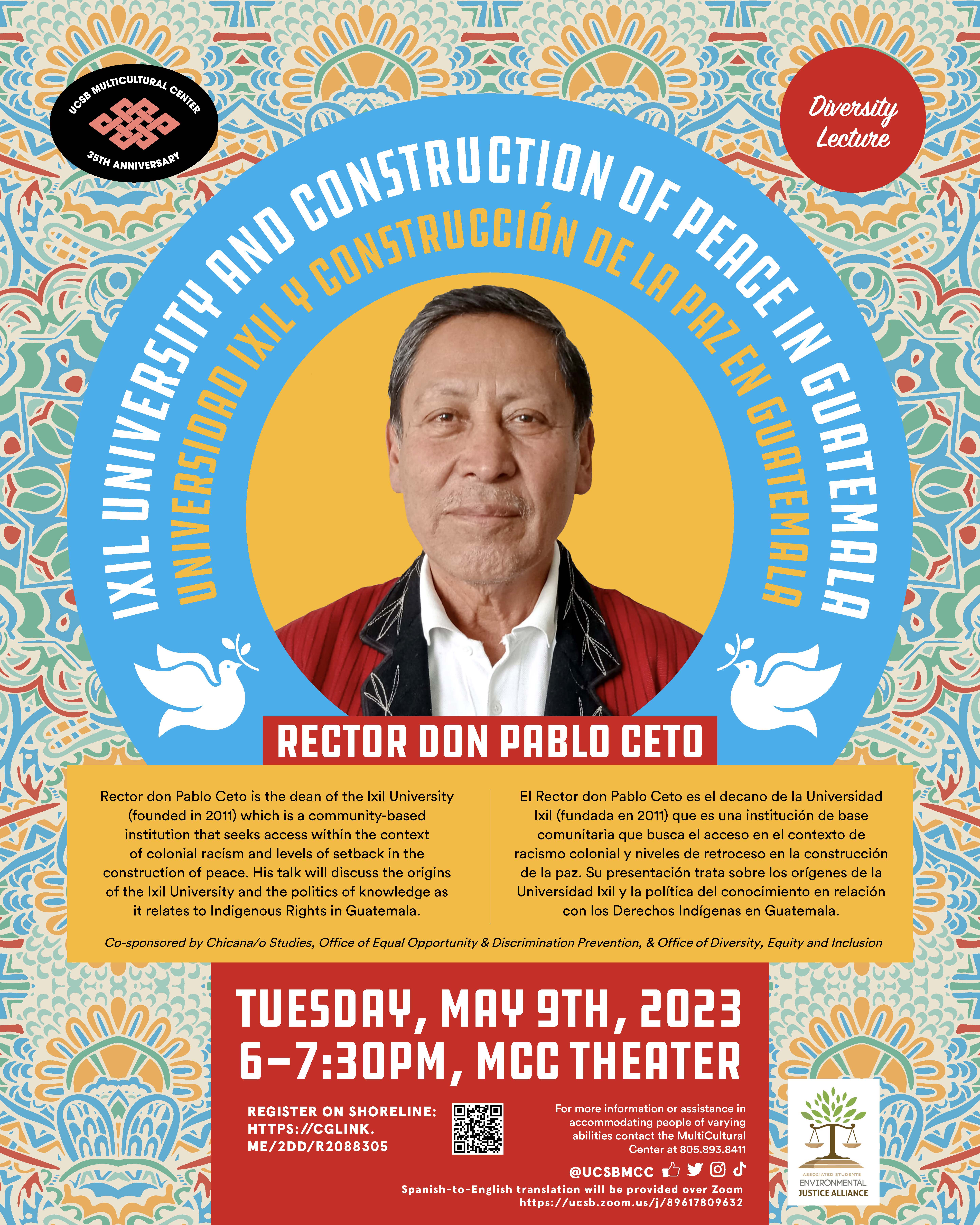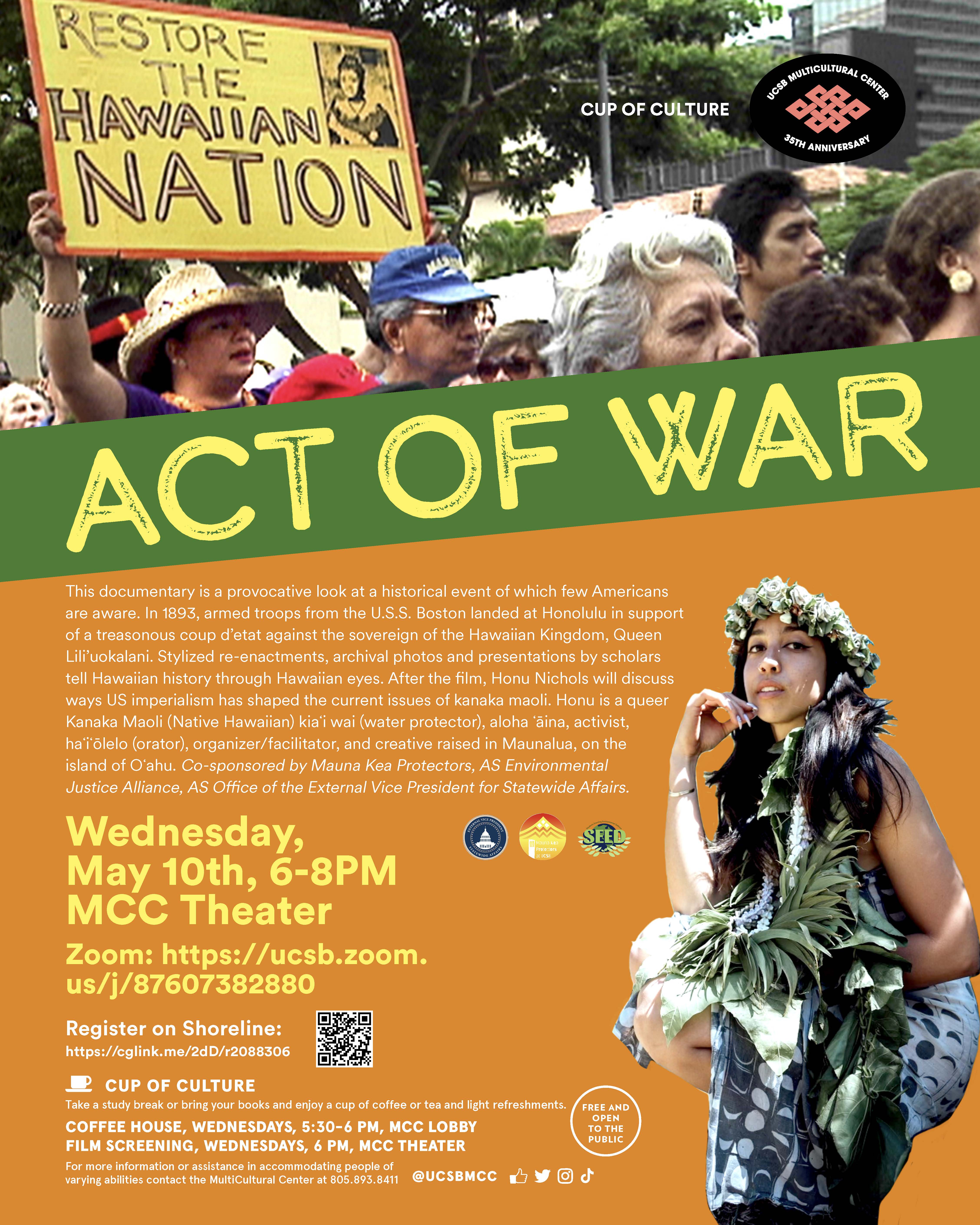All Events

Cup of Culture
Mom
A film by Xun Sero
MCC Theater
As a Mexican Tzotzil I grew up between the sacrality both of Guadalupe Virgin and Mother Earth. As a son, I grew up among the derision of not having a father and blaming my mother for it. “Mom” is a dialogue between mother and son exploring their contradictions, knowing and recognizing each other, and reflecting on naturalized violence and its reproduction.
Documentary | Director: Xun Sero | Running time: 80 min. | Country: Mexico | Year: 2022 | Produced by: Terra Nostra Films

Diversity Lecture
Ixil University and Construction of Peace in Guatemala / Universidad Ixil y Construcción de la Paz en Guatemala
Rector don Pablo Ceto
MCC Theater
The Ixil University was founded (2011) as an effort to exercise the rights of the Ixil People in the framework of the construction of peace (December 19, 1996), particularly the Agreement on Identity and Rights of Indigenous Peoples (March 31, 1995). Ixil University is communal, as it develops in the Communities, drawing on ancestral Mayan knowledge on community management of territory, family farming and food, Culture, identity and rights of indigenous Peoples, and it is communal because it seeks access, learning and application of other sciences and technologies to train actors of the good living of the Peoples and of Guatemala, within the context of colonial racism and levels of setback in the construction of peace.
La Universidad Ixil nace (2011) como un esfuerzo de ejercicio de derechos del Pueblo Ixil en el marco de la construcción de la paz (19 de diciembre de 1996), particularmente del Acuerdo sobre Identidad y Derechos de los Pueblos Indígenas (31 de marzo de 1995). Es comunitaria, en tanto, se desenvuelve en las Comunidades, nutriéndose de los conocimientos ancestrales mayas sobre gestión comunitaria del territorio, agricultura familiar y alimentaria, y Cultura, identidad y derechos de los Pueblos indígenas, y es comunitaria porque busca el acceso, aprendizaje y aplicación de las otras ciencias y tecnologías para formar actores del buen vivir de los Pueblos y de Guatemala, en un contexto racismo colonial y de niveles de retroceso en la construcción de la paz.
Moderated by: / Moderado por: Dr. Giovanni Batz (Chicana/o Studies)
Speaker Bio: Pablo Ignacio Ceto Sánchez is the co-creator and member of the Rectory of the Ixil University in Guatemala / Pablo Ignacio Ceto Sánchez es el co-creador y miembro de la Rectoría de la Universidad Ixil en Guatemala
Spanish-to-English translation will be provided over Zoom: https://ucsb.zoom.us/j/89617809632

Cup of Culture
Act of War Screening & Post Film Discussion with Honu Nichols
Honu Nichols following the film
MCC Theater and Zoom
This hour-long documentary is a provocative look at a historical event of which few Americans are aware. In mid-January, 1893, armed troops from the U.S.S. Boston landed at Honolulu in support of a treasonous coup d’etat against the constitutional sovereign of the Hawaiian Kingdom, Queen Lili’uokalani. The event was described by U.S. President Grover Cleveland as “an act of war.” Stylized re-enactments, archival photos and film, political cartoons, historic quotes and presentations by Hawaiian scholars tell Hawaiian history through Hawaiian eyes.
7-8PM (PST) After this screening, Honu will share a presentation on the ways US imperialism has shaped the current issues of kanaka maoli, and the importance of demilitarization in the land sovereignty movements in the Native Hawaiian case and other territories. This presentation will be followed by a discussion on how Hawaiian Renaissance leaders laid the foundation for today’s young activists to ask new questions about what it looks like to transition into a radically reimagined world governed by the principles of self-determination.
Remote attendees can access this event using the following Zoom link:
https://ucsb.zoom.us/j/87607382880
Meeting ID: 876 0738 2880
Speaker Bio: Honu is a queer Kanaka Maoli (Native Hawaiian) kiaʻi wai (water protector), aloha ʻāina, activist, haʻiʻōlelo (orator), organizer/facilitator, and creative raised in Maunalua, on the island of Oʻahu. They are kanaka diaspora born on Ohlone Lands. Honu currently works at Loko Ea fishpond, a 400-year-old traditional fishpond, as a research alakaʻi (lead) and restoration assistant. As a kumu (teacher), Honu educated elementary students through moʻolelo (stories), place-based education, mele (song), and good ol’ fashion hard work. While a student at UCSB, they organized with the UCDivestTMT campaign, mobilizing students across California to demand the UC divest, and reinvest in their students and indigenous communities. Honu’s pursuits are directed towards a complete hulihia (overturn) of decision-making power from Hawaiʻi throughout Moku Honu (Turtle Island). Their activism focuses on food sovereignty, decolonization/demilitarization, the protection of sacred sites, emboldening the ʻoiaʻiʻo (truth) of our histories and healing through connection to place.
Co- Sponsors: Mauna Kea Protectors, AS Environmental Justice Alliance, AS Office of the External Vice President for Statewide Affairs

Advocacy and the Power of Affirmations
Afiya Sunflower
MCC Lounge
Join us for a night of self-discovery and creativity as we learn from Activist and Astrologer Afiya Sunflower on how to use affirmations and mindfulness practices to regain self-empowerment before, during, and after advocacy work, a commitment that requires championing for yourself and others. To help ground you in this journey, join us to create and decorate your affirmation cup and add it to your empowerment tool kit! Food will be provided!
PRESENTER Afiya Sunflower Activist and Astrologer Afiya Sunflower is an astrologer, artist, activist, advisor and mindfulness coach. Through her writing, empowerment artwork, one-on-one consulting and mindfulness workshops, Afiya combines astrology, spirituality, and indigenous knowledge and practices to facilitate healing and energy transformation for BIPOC and LGBTQA+ individuals and communities. You can experience and engage with her work via Instagram @a_sunflower.power
RSVP at Shoreline: https://cglink.me/2dD/r2111090
